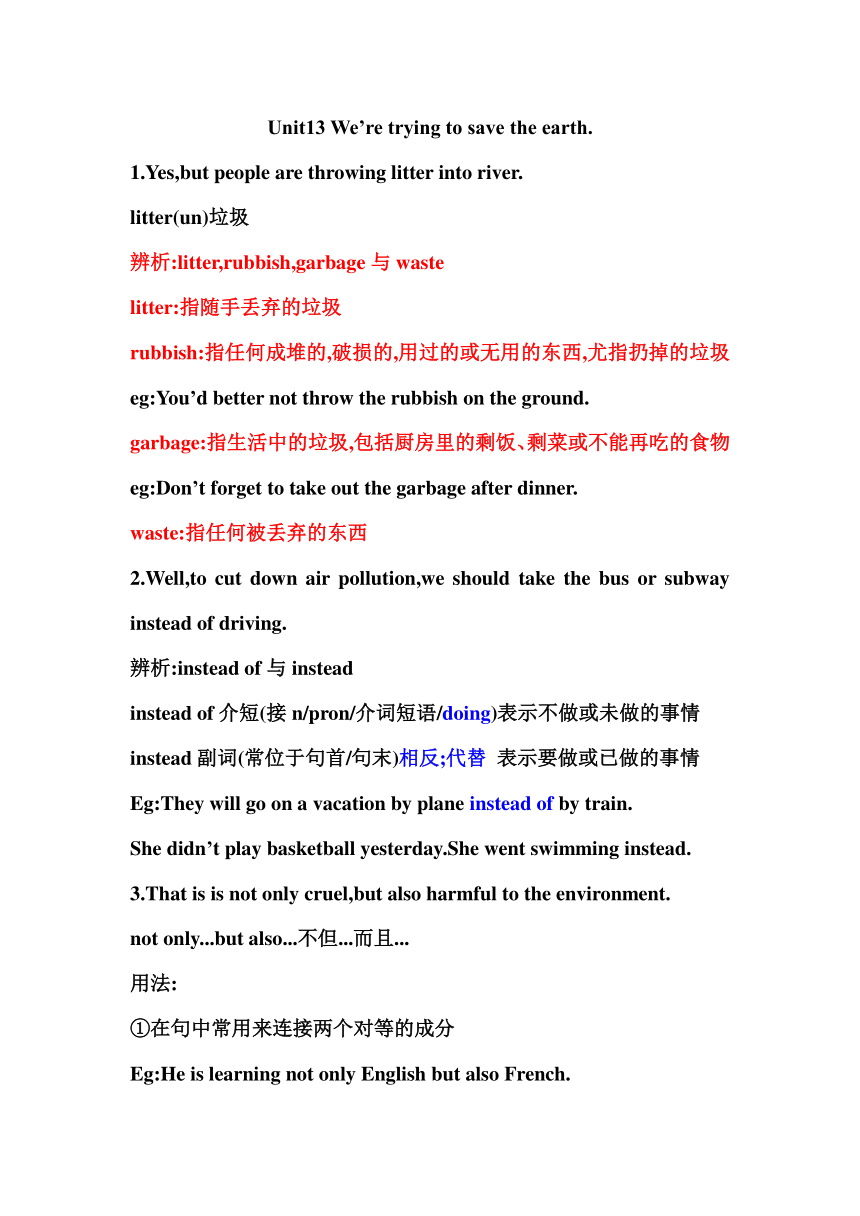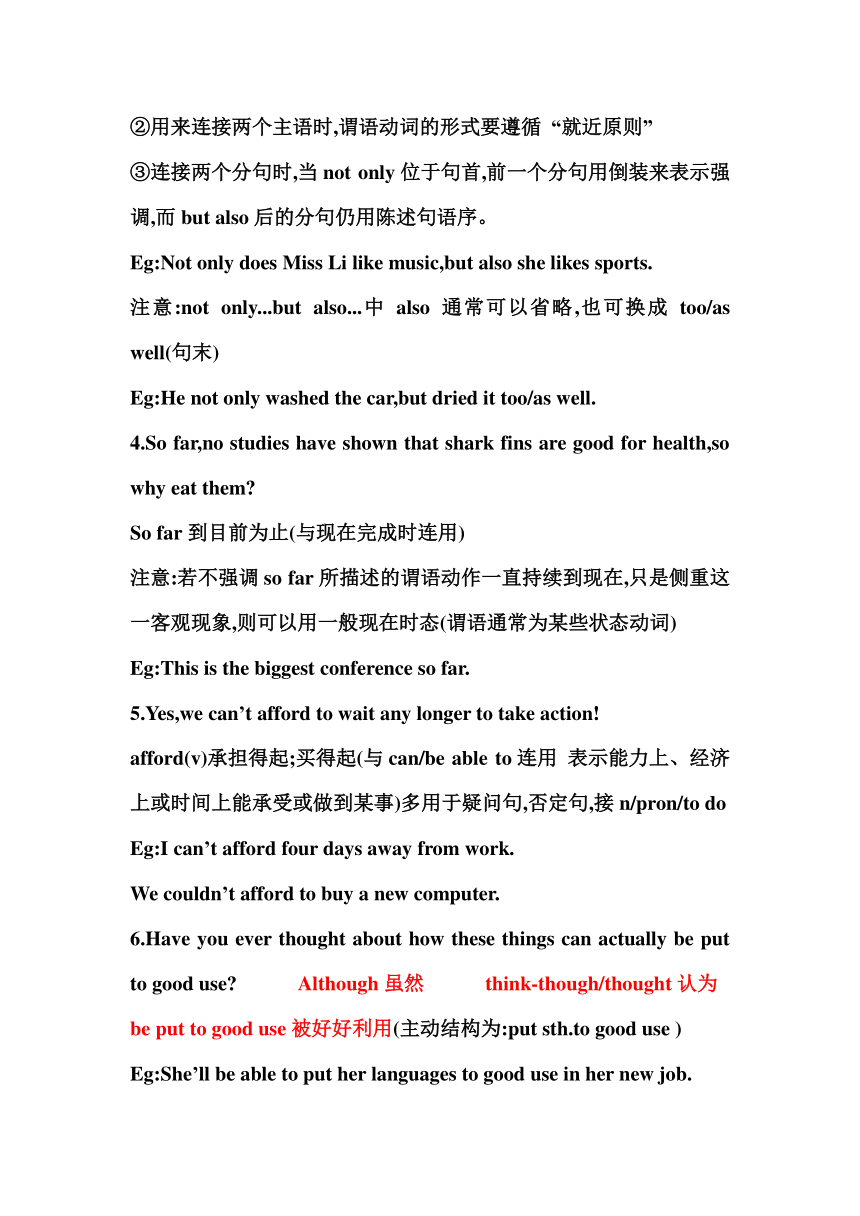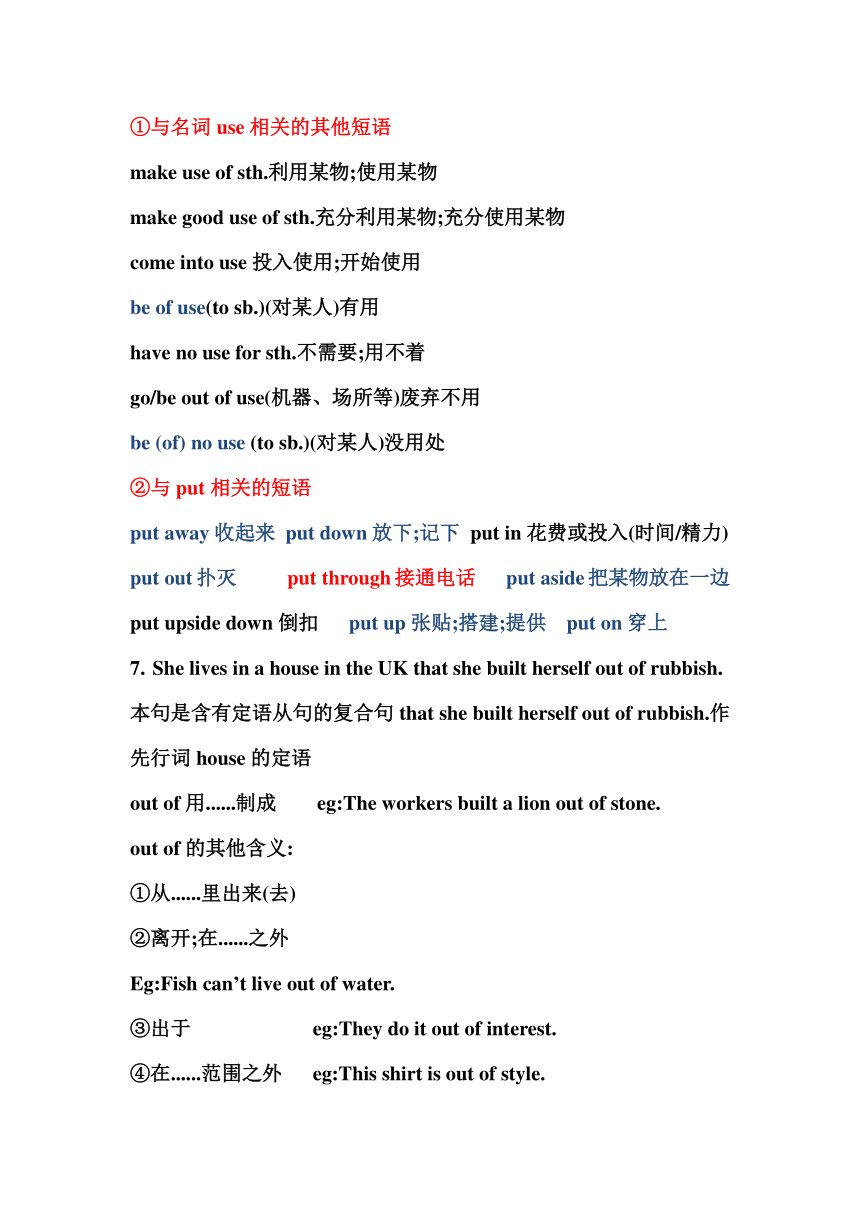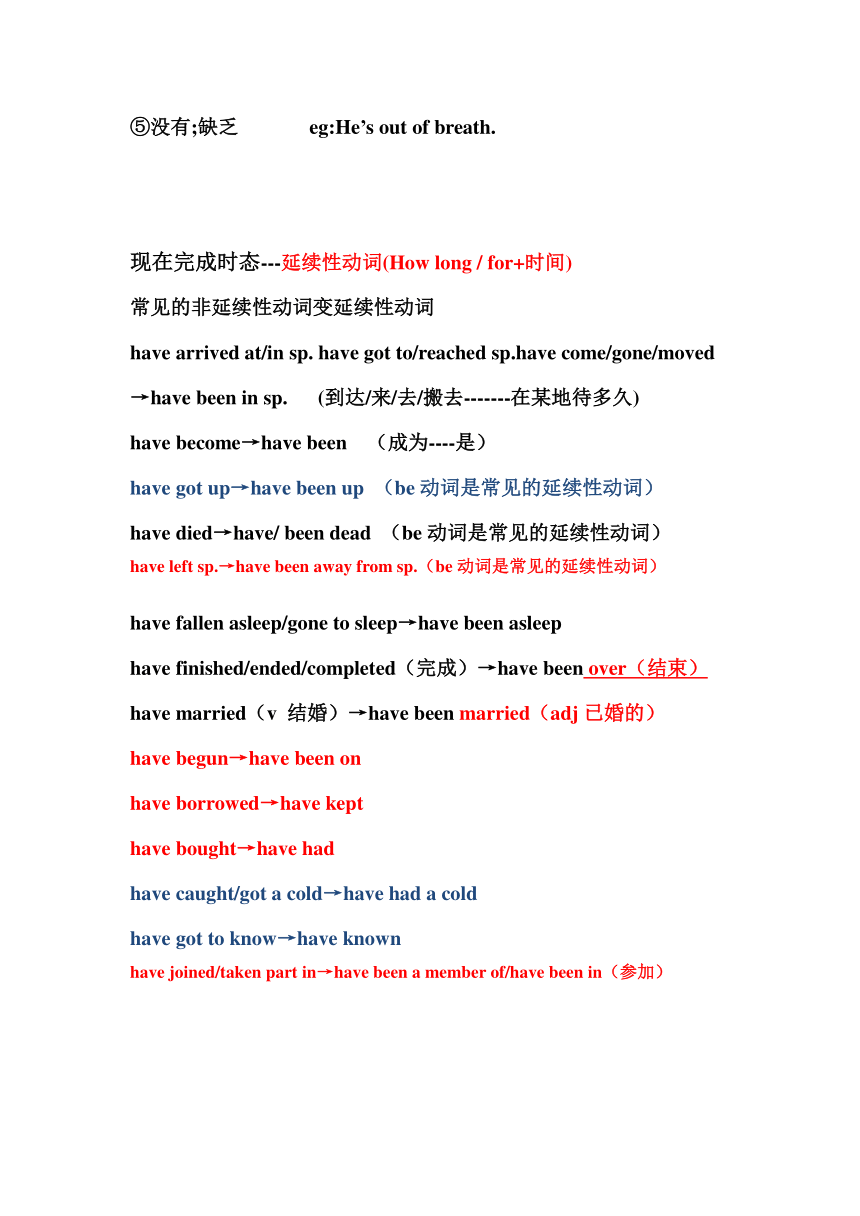Unit 13-Unit 14 讲义 人教版九年级英语全册
文档属性
| 名称 | Unit 13-Unit 14 讲义 人教版九年级英语全册 |  | |
| 格式 | docx | ||
| 文件大小 | 26.5KB | ||
| 资源类型 | 教案 | ||
| 版本资源 | 人教新目标(Go for it)版 | ||
| 科目 | 英语 | ||
| 更新时间 | 2024-01-11 21:49:53 | ||
图片预览




文档简介
Unit13 We’re trying to save the earth.
1.Yes,but people are throwing litter into river.
litter(un)垃圾
辨析:litter,rubbish,garbage与waste
litter:指随手丢弃的垃圾
rubbish:指任何成堆的,破损的,用过的或无用的东西,尤指扔掉的垃圾 eg:You’d better not throw the rubbish on the ground.
garbage:指生活中的垃圾,包括厨房里的剩饭、剩菜或不能再吃的食物 eg:Don’t forget to take out the garbage after dinner.
waste:指任何被丢弃的东西
2.Well,to cut down air pollution,we should take the bus or subway instead of driving.
辨析:instead of与instead
instead of介短(接n/pron/介词短语/doing)表示不做或未做的事情
instead副词(常位于句首/句末)相反;代替 表示要做或已做的事情
Eg:They will go on a vacation by plane instead of by train.
She didn’t play basketball yesterday.She went swimming instead.
3.That is is not only cruel,but also harmful to the environment.
not only...but also...不但...而且...
用法:
①在句中常用来连接两个对等的成分
Eg:He is learning not only English but also French.
②用来连接两个主语时,谓语动词的形式要遵循 “就近原则”
③连接两个分句时,当not only位于句首,前一个分句用倒装来表示强调,而but also后的分句仍用陈述句语序。
Eg:Not only does Miss Li like music,but also she likes sports.
注意:not only...but also...中also通常可以省略,也可换成too/as well(句末)
Eg:He not only washed the car,but dried it too/as well.
4.So far,no studies have shown that shark fins are good for health,so why eat them
So far到目前为止(与现在完成时连用)
注意:若不强调so far所描述的谓语动作一直持续到现在,只是侧重这一客观现象,则可以用一般现在时态(谓语通常为某些状态动词)
Eg:This is the biggest conference so far.
5.Yes,we can’t afford to wait any longer to take action!
afford(v)承担得起;买得起(与can/be able to连用 表示能力上、经济上或时间上能承受或做到某事)多用于疑问句,否定句,接n/pron/to do
Eg:I can’t afford four days away from work.
We couldn’t afford to buy a new computer.
6.Have you ever thought about how these things can actually be put to good use Although虽然 think-though/thought认为
be put to good use被好好利用(主动结构为:put sth.to good use )
Eg:She’ll be able to put her languages to good use in her new job.
①与名词use相关的其他短语
make use of sth.利用某物;使用某物
make good use of sth.充分利用某物;充分使用某物
come into use投入使用;开始使用
be of use(to sb.)(对某人)有用
have no use for sth.不需要;用不着
go/be out of use(机器、场所等)废弃不用
be (of) no use (to sb.)(对某人)没用处
②与put相关的短语
put away收起来 put down放下;记下 put in花费或投入(时间/精力)
put out扑灭 put through接通电话 put aside把某物放在一边
put upside down倒扣 put up张贴;搭建;提供 put on穿上
She lives in a house in the UK that she built herself out of rubbish.
本句是含有定语从句的复合句that she built herself out of rubbish.作先行词house的定语
out of用......制成 eg:The workers built a lion out of stone.
out of的其他含义:
①从......里出来(去)
②离开;在......之外
Eg:Fish can’t live out of water.
③出于 eg:They do it out of interest.
④在......范围之外 eg:This shirt is out of style.
⑤没有;缺乏 eg:He’s out of breath.
现在完成时态---延续性动词(How long / for+时间)
常见的非延续性动词变延续性动词
have arrived at/in sp. have got to/reached sp.have come/gone/moved
→have been in sp. (到达/来/去/搬去-------在某地待多久)
have become→have been (成为----是)
have got up→have been up (be动词是常见的延续性动词)
have died→have/ been dead (be动词是常见的延续性动词)
have left sp.→have been away from sp.(be动词是常见的延续性动词)
have fallen asleep/gone to sleep→have been asleep
have finished/ended/completed(完成)→have been over(结束)
have married(v 结婚)→have been married(adj已婚的)
have begun→have been on
have borrowed→have kept
have bought→have had
have caught/got a cold→have had a cold
have got to know→have known
have joined/taken part in→have been a member of/have been in(参加)
Unit14 I remember meeting all of you in Grade 7.
1.A friend helping me with a problem.
helping me with a problem现在分词短语作定语,修饰a friend,表明a friend与help之间是主动关系
Eg:I don’t know the boy lying on the grass.
He is an honest boy never lying to others.
注意:过去分词短语作定语时,表明被修饰的词和动词之间是被动关系
Eg:I’ll repair the chair broken by a naughty boy.
Someone was advised to take a break from running by a teacher.
take a break:休息(have a break from (doing)sth.)
have a rest休息
do sth.without a break不停地做某事
“take a+n”构成的短语:
take a chance冒险 take a picture照相
take a bath洗澡 take a walk散步
take a rest休息 take a look看一看
3.She helped you to work out the answers yourself no matter how difficult they were.
“no matter how”无论怎样(however,引导让步状语从句)
“no matter+疑问词”引导让步状语从句
no matter what(whatever) no matter who(whoever)
no matter where(wherever) no matter when(when)
注意:引导名词性从句、时间状语从句、地点状语从句时,只能用 “疑问词+ever”
Eg:He does whatever she asks him to do.
4.Shall we get each of them a card and a gift to say thank you
“ Shall we/I+动原+其他”为表示建议的句型
常见的表示建议的句型:
①What/How about doing sth. 做什么事情怎么样呢?
②Why not do... /Why don’t you do... 为什么不..?/你为什么不...?
③You’d better do...你最好做....
④Would you like to do.... 你想要做什么
⑤Let’s do... 让我们...吧。
⑥Could you please do... 请你做...好吗
⑦Would you mind doing... 你介意....?
5.And making a great big mess
make a mess弄得一团糟 mess混乱;狼藉;一团糟
make a mess of把......弄得一团糟
be in a mess乱七八糟
get...into a mess使...陷入困境;使...遇到麻烦
And yes,some of you were a little difficult to deal with.
辨析:deal with与do with
①deal with与do with表示处理 deal侧重于方式 do侧重于对象
②deal是不及物动词;do是及物动词 deal with与how连用
do with与what连用
Eg:I don’t know how they deal with the problem.
I don’t know what they do with the problem.
③deal with需要注意的地方:在动词不定式短语to deal with中,with后必须带宾语
Eg:I don’t know how to deal with it.
7.Although you’ve all worked very hard over the last three years,none of you did it alone.(adv 独自地)
none of没有一个;都不(接不可数名词,谓语动词用单数;接可数名词复数,谓语动词用单、复数形式均可)
Eg:None of the money belongs to me.
None of the students has/have seen me before.
易错点:
①与none不同,nobody/no one常用来指人,不与of连用,作主语时谓语动词要用单数形式(nobody/no one 作主语,谓语动词只能用单数形式)
②none与数量有关,常用来回答how many/how much开头的句子
表示:一个也没有
no one常用来回答who引导的句子,表示:没有人
Eg:-How many students have gone abroad in your class
-None.
-Who is on duty today -No one.
辨析:none of,all of,both of,neither of与either of
none of(用于三者及以上,表否定)作主语时,若of后接复数,谓语动词用单复数皆可;若of后接不可数名词,谓语动词用单数
all of(用于三者及以上,表肯定)作主语时,若of后接复数,谓语动词用复数;若of后接不可数名词,谓语动词用单数
both of(用于两者之间,表肯定)两者都 作主语时,谓语动词用复数
neither of(用于两者之间,表否定)两者都不 作主语时,谓语用单数或复数
either of(用于两者之间,表肯定)两者中任一 作主语时,谓语用单数
Eg:None of these cars is/are new.
Neither of the films is/are good.
8.I don’t need to tell you that life in senior high school will be harder and that you have many difficult tasks ahead of you.
ahead of(在空间或时间上比某人或某事)更前、更早或更先进;领先
Eg:He left one day ahead of me.
He is always ahead of the age. 他总是走在时代的前沿
注意:ahead of time提前;提早 也可表示ahead of schedule
ahead(副词)向前;在前面(主要用作状语,有时也用作后置定语或表语)
Eg:The road ahead was full of cars.
Our team is ahead by two runs.
There’s danger ahead.
“go ahead”表示同意或允许继续做某事
9.But along with difficulties,there will also be many exciting things waiting for you.
along with连同;除...以外还
Eg:Tom went swimming,along with his friends.
如果主语为单数名词或代词,尽管后面跟有along with,with,together with,except,as well as,besides,but(除了),rather than等 谓语动词仍用单数形式,若原来的主语是复数,则谓语动词用复数形式
Eg:A girl along with Mary is good at drawing.
10.Although you have to go your separate ways now,I hope that in a few years’ time...
辨析:divide与separate
divide:将整体分成若干部分,常与into连用
Eg:The whole class was divided into five groups.
separate:指把原来混合在一起的事物或人分开或隔离,常与from连用
Eg:England is separated from France by a channel.
1.Yes,but people are throwing litter into river.
litter(un)垃圾
辨析:litter,rubbish,garbage与waste
litter:指随手丢弃的垃圾
rubbish:指任何成堆的,破损的,用过的或无用的东西,尤指扔掉的垃圾 eg:You’d better not throw the rubbish on the ground.
garbage:指生活中的垃圾,包括厨房里的剩饭、剩菜或不能再吃的食物 eg:Don’t forget to take out the garbage after dinner.
waste:指任何被丢弃的东西
2.Well,to cut down air pollution,we should take the bus or subway instead of driving.
辨析:instead of与instead
instead of介短(接n/pron/介词短语/doing)表示不做或未做的事情
instead副词(常位于句首/句末)相反;代替 表示要做或已做的事情
Eg:They will go on a vacation by plane instead of by train.
She didn’t play basketball yesterday.She went swimming instead.
3.That is is not only cruel,but also harmful to the environment.
not only...but also...不但...而且...
用法:
①在句中常用来连接两个对等的成分
Eg:He is learning not only English but also French.
②用来连接两个主语时,谓语动词的形式要遵循 “就近原则”
③连接两个分句时,当not only位于句首,前一个分句用倒装来表示强调,而but also后的分句仍用陈述句语序。
Eg:Not only does Miss Li like music,but also she likes sports.
注意:not only...but also...中also通常可以省略,也可换成too/as well(句末)
Eg:He not only washed the car,but dried it too/as well.
4.So far,no studies have shown that shark fins are good for health,so why eat them
So far到目前为止(与现在完成时连用)
注意:若不强调so far所描述的谓语动作一直持续到现在,只是侧重这一客观现象,则可以用一般现在时态(谓语通常为某些状态动词)
Eg:This is the biggest conference so far.
5.Yes,we can’t afford to wait any longer to take action!
afford(v)承担得起;买得起(与can/be able to连用 表示能力上、经济上或时间上能承受或做到某事)多用于疑问句,否定句,接n/pron/to do
Eg:I can’t afford four days away from work.
We couldn’t afford to buy a new computer.
6.Have you ever thought about how these things can actually be put to good use Although虽然 think-though/thought认为
be put to good use被好好利用(主动结构为:put sth.to good use )
Eg:She’ll be able to put her languages to good use in her new job.
①与名词use相关的其他短语
make use of sth.利用某物;使用某物
make good use of sth.充分利用某物;充分使用某物
come into use投入使用;开始使用
be of use(to sb.)(对某人)有用
have no use for sth.不需要;用不着
go/be out of use(机器、场所等)废弃不用
be (of) no use (to sb.)(对某人)没用处
②与put相关的短语
put away收起来 put down放下;记下 put in花费或投入(时间/精力)
put out扑灭 put through接通电话 put aside把某物放在一边
put upside down倒扣 put up张贴;搭建;提供 put on穿上
She lives in a house in the UK that she built herself out of rubbish.
本句是含有定语从句的复合句that she built herself out of rubbish.作先行词house的定语
out of用......制成 eg:The workers built a lion out of stone.
out of的其他含义:
①从......里出来(去)
②离开;在......之外
Eg:Fish can’t live out of water.
③出于 eg:They do it out of interest.
④在......范围之外 eg:This shirt is out of style.
⑤没有;缺乏 eg:He’s out of breath.
现在完成时态---延续性动词(How long / for+时间)
常见的非延续性动词变延续性动词
have arrived at/in sp. have got to/reached sp.have come/gone/moved
→have been in sp. (到达/来/去/搬去-------在某地待多久)
have become→have been (成为----是)
have got up→have been up (be动词是常见的延续性动词)
have died→have/ been dead (be动词是常见的延续性动词)
have left sp.→have been away from sp.(be动词是常见的延续性动词)
have fallen asleep/gone to sleep→have been asleep
have finished/ended/completed(完成)→have been over(结束)
have married(v 结婚)→have been married(adj已婚的)
have begun→have been on
have borrowed→have kept
have bought→have had
have caught/got a cold→have had a cold
have got to know→have known
have joined/taken part in→have been a member of/have been in(参加)
Unit14 I remember meeting all of you in Grade 7.
1.A friend helping me with a problem.
helping me with a problem现在分词短语作定语,修饰a friend,表明a friend与help之间是主动关系
Eg:I don’t know the boy lying on the grass.
He is an honest boy never lying to others.
注意:过去分词短语作定语时,表明被修饰的词和动词之间是被动关系
Eg:I’ll repair the chair broken by a naughty boy.
Someone was advised to take a break from running by a teacher.
take a break:休息(have a break from (doing)sth.)
have a rest休息
do sth.without a break不停地做某事
“take a+n”构成的短语:
take a chance冒险 take a picture照相
take a bath洗澡 take a walk散步
take a rest休息 take a look看一看
3.She helped you to work out the answers yourself no matter how difficult they were.
“no matter how”无论怎样(however,引导让步状语从句)
“no matter+疑问词”引导让步状语从句
no matter what(whatever) no matter who(whoever)
no matter where(wherever) no matter when(when)
注意:引导名词性从句、时间状语从句、地点状语从句时,只能用 “疑问词+ever”
Eg:He does whatever she asks him to do.
4.Shall we get each of them a card and a gift to say thank you
“ Shall we/I+动原+其他”为表示建议的句型
常见的表示建议的句型:
①What/How about doing sth. 做什么事情怎么样呢?
②Why not do... /Why don’t you do... 为什么不..?/你为什么不...?
③You’d better do...你最好做....
④Would you like to do.... 你想要做什么
⑤Let’s do... 让我们...吧。
⑥Could you please do... 请你做...好吗
⑦Would you mind doing... 你介意....?
5.And making a great big mess
make a mess弄得一团糟 mess混乱;狼藉;一团糟
make a mess of把......弄得一团糟
be in a mess乱七八糟
get...into a mess使...陷入困境;使...遇到麻烦
And yes,some of you were a little difficult to deal with.
辨析:deal with与do with
①deal with与do with表示处理 deal侧重于方式 do侧重于对象
②deal是不及物动词;do是及物动词 deal with与how连用
do with与what连用
Eg:I don’t know how they deal with the problem.
I don’t know what they do with the problem.
③deal with需要注意的地方:在动词不定式短语to deal with中,with后必须带宾语
Eg:I don’t know how to deal with it.
7.Although you’ve all worked very hard over the last three years,none of you did it alone.(adv 独自地)
none of没有一个;都不(接不可数名词,谓语动词用单数;接可数名词复数,谓语动词用单、复数形式均可)
Eg:None of the money belongs to me.
None of the students has/have seen me before.
易错点:
①与none不同,nobody/no one常用来指人,不与of连用,作主语时谓语动词要用单数形式(nobody/no one 作主语,谓语动词只能用单数形式)
②none与数量有关,常用来回答how many/how much开头的句子
表示:一个也没有
no one常用来回答who引导的句子,表示:没有人
Eg:-How many students have gone abroad in your class
-None.
-Who is on duty today -No one.
辨析:none of,all of,both of,neither of与either of
none of(用于三者及以上,表否定)作主语时,若of后接复数,谓语动词用单复数皆可;若of后接不可数名词,谓语动词用单数
all of(用于三者及以上,表肯定)作主语时,若of后接复数,谓语动词用复数;若of后接不可数名词,谓语动词用单数
both of(用于两者之间,表肯定)两者都 作主语时,谓语动词用复数
neither of(用于两者之间,表否定)两者都不 作主语时,谓语用单数或复数
either of(用于两者之间,表肯定)两者中任一 作主语时,谓语用单数
Eg:None of these cars is/are new.
Neither of the films is/are good.
8.I don’t need to tell you that life in senior high school will be harder and that you have many difficult tasks ahead of you.
ahead of(在空间或时间上比某人或某事)更前、更早或更先进;领先
Eg:He left one day ahead of me.
He is always ahead of the age. 他总是走在时代的前沿
注意:ahead of time提前;提早 也可表示ahead of schedule
ahead(副词)向前;在前面(主要用作状语,有时也用作后置定语或表语)
Eg:The road ahead was full of cars.
Our team is ahead by two runs.
There’s danger ahead.
“go ahead”表示同意或允许继续做某事
9.But along with difficulties,there will also be many exciting things waiting for you.
along with连同;除...以外还
Eg:Tom went swimming,along with his friends.
如果主语为单数名词或代词,尽管后面跟有along with,with,together with,except,as well as,besides,but(除了),rather than等 谓语动词仍用单数形式,若原来的主语是复数,则谓语动词用复数形式
Eg:A girl along with Mary is good at drawing.
10.Although you have to go your separate ways now,I hope that in a few years’ time...
辨析:divide与separate
divide:将整体分成若干部分,常与into连用
Eg:The whole class was divided into five groups.
separate:指把原来混合在一起的事物或人分开或隔离,常与from连用
Eg:England is separated from France by a channel.
同课章节目录
- Unit 1 How can we become good learners.
- Section A
- Section B
- Unit 2 I think that mooncakes are delicious!
- Section A
- Section B
- Unit 3 Could you please tell me where the restroom
- Section A
- Section B
- Unit 4 I used to be afraid of the dark.
- Section A
- Section B
- Unit 5 What are the shirts made of?
- Section A
- Section B
- Review of Units 1-5
- Unit 6 When was it invented?
- Section A
- Section B
- Unit 7 Teenagers should be allowed to choose their
- Section A
- Section B
- Unit 8 It must belong to Carla.
- Section A
- Section B
- Unit 9 I like music that I can dance to.
- Section A
- Section B
- Unit 10 You're supposed to shake hands.
- Section A
- Section B
- Review of Units 6-10
- Unit 11 Sad movies make me cry.
- Section A
- Section B
- Unit 12 Life is full of the unexpected
- Section A
- Section B
- Unit 13 We're trying to save the earth!
- Section A
- Section B
- Unit 14 I remember meeting all of you in Grade 7.
- Section A
- Section B
- Review of Units 11-14
